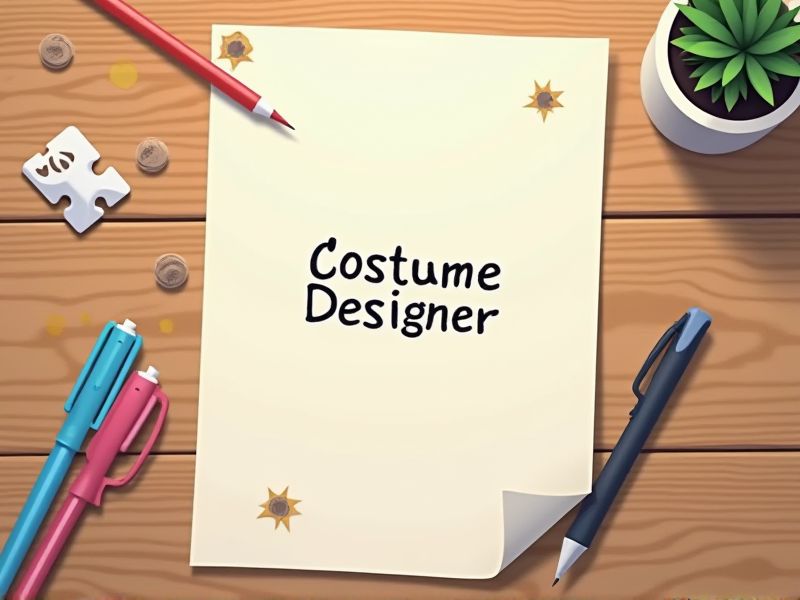
Costume designers are integral to bringing visual storytelling to life, requiring a blend of creativity and technical skill. Certifications validate a designer's knowledge in areas like color theory, fabric manipulation, and historical fashion accuracy, which are essential for meeting diverse production demands. They also enhance a designer's credibility, expanding opportunities in competitive industry landscapes. Below are some essential certifications that can enhance your career as a costume designer.
Certified Costume Professional (CCP)
Costume designers benefit from being Certified Costume Professionals (CCP) as it enhances their credibility and assures clients of their expertise in costume design. The CCP credential often leads to increased job opportunities, given that employers and collaborators increasingly seek certified individuals. It also signals a commitment to continuing education and staying updated with industry standards and advancements. The certification process equips costume designers with specialized skills and valuable knowledge that improve their creative and technical abilities.
Costume Design & History Certificate
Earning a Costume Design & History Certificate equips a designer with specialized knowledge about historical fashion trends, enhancing their ability to create authentic period costumes. Possessing this certificate often signals to employers a commitment to their craft and a higher level of expertise, which can increase job opportunities. Understanding historical contexts and textile evolution allows designers to accurately represent characters in specific eras. Formal education in costume history broadens a designer's cultural perspective, fostering more innovative and informed design choices.
Textile Design Certification
Textile Design Certification equips costume designers with essential knowledge of fabrics and materials, impacting their ability to choose suitable textiles for specific designs. Exposure to diverse textile techniques through certification enhances creativity and innovation in costume production. Understanding textile properties ensures costume designers can effectively manipulate fabrics to achieve desired visual and functional outcomes. Certification often validates a designer's expertise, building credibility and trust with clients and collaborators in the industry.
Pattern Making Certification
Gaining a Pattern Making Certification enhances a costume designer's technical skills, allowing them to create precise garment blueprints. With this certification, designers understand fabric behavior better, leading to more effective material usage and reduced waste. Employers recognize certified designers as equipped with essential skills, increasing their career opportunities and potential salaries. The certification process imparts a thorough understanding of sizing and fit, ensuring costumes comfortably fit various body types.
Sewing & Tailoring Certification
Obtaining a Sewing & Tailoring Certification enhances a costume designer's understanding of garment construction, leading to improved quality and precision in design. This certification provides technical skills that enable designers to better communicate and collaborate with tailors, aligning creative vision with practical execution. Knowledge gained from the certification aids in troubleshooting design issues, which results in more efficient workflows and reduced production errors. Having certified skills can also provide a competitive edge in the industry, increasing job opportunities and professional credibility.
Adobe Creative Suite Certification
Gaining Adobe Creative Suite Certification enhances a costume designer's technical proficiency, enabling efficient manipulation of design software. This certification substantiates one's commitment to professional development, making a designer more appealing to employers. Competence in tools like Photoshop and Illustrator allows for precise digital sketches and mood boards, facilitating clearer communication with directors and production teams. Additionally, possessing this certification often leads to increased freelance opportunities, as it demonstrates a standardized level of skill mastery to potential clients.
Draping & Garment Construction Certification
A Draping & Garment Construction Certification equips a costume designer with technical skills essential for transforming fabric into functional costumes, which directly impacts the quality of their designs. Proficiency in garment construction ensures that designers can better realize their artistic visions, leading to more accurate and expressive costumes. The certification provides recognition of competence, potentially increasing job opportunities and credibility within the industry. Knowledge from such a program aids in problem-solving on the job, allowing designers to efficiently address costume fitting and modification challenges.
Theatrical Costume Design Certification
Theatrical Costume Design Certification equips designers with specialized knowledge, enhancing their ability to create historically accurate and contextually appropriate costumes. Certified designers often gain recognition from industry professionals, increasing their job prospects and credibility in theatrical productions. The structured curriculum provides exposure to a range of materials and techniques, broadening the designer's skill set. Certification often involves practical experiences, enabling designers to build a robust portfolio that showcases their capabilities.
Fashion Illustration Certification
Fashion Illustration Certification equips costume designers with foundational skills in illustration that are essential for visualizing and communicating design concepts. Certification programs often include training in various digital tools and techniques, enhancing a designer's ability to create precise and professional presentations. Understanding fashion illustration improves collaboration with directors and production teams by providing clear and articulate visual references. Holding a certification can enhance a designer's credibility and marketability within the competitive costume design industry.
Portfolio Development for Costume Designers Certification
The Portfolio Development for Costume Designers Certification enhances a designer's credibility and professionalism, often leading to more job opportunities. By formalizing skills through certification, designers can better demonstrate their expertise in various costume design techniques. Access to a structured curriculum allows designers to refine their creative processes and stay updated with industry trends. Certification often involves networking opportunities, connecting designers with industry professionals and potential collaborators.
Summary
You can expect enhanced career opportunities when Costume Designers obtain certifications. Employers often prioritize certified professionals, which can lead to increased job offers and project involvement. Your skills get validated through formal recognition, boosting credibility in the industry. Certified designers can negotiate better salaries, reflecting their specialized expertise.
